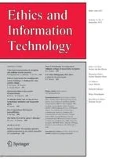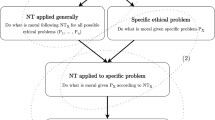Abstract
Is machine autonomy the same as human autonomy? Answers to this question are developed inphilosophical dialogue. Becket Geist, a romanticphilosopher with scientific leanings, is irked by thearrogance of Fortran McCyborg – a Model 2000 cyborg. Nonette Naturski, a champion of naturalistic views,joins Becket in playing devil's advocate by arguingthat Fortran's actions are voluntary, not chosen byhim, and lacking the freedom caused by deliberatedesire. With the attempts to reduce Fortran's status,Fortran ups the ante by arguing for yet higher status– that he is an angel. The dialogue with therealization that the conversation which denied Fortranautonomous status presupposed it on some level. Angelic Machines picks up where Loss of theWorld leaves off.
Similar content being viewed by others
Author information
Authors and Affiliations
Rights and permissions
About this article
Cite this article
Kolcaba, R. Angelic machines: A philosophical dialogue (2). Ethics and Information Technology 2, 11–17 (2000). https://doi.org/10.1023/A:1010051927180
Issue Date:
DOI: https://doi.org/10.1023/A:1010051927180



